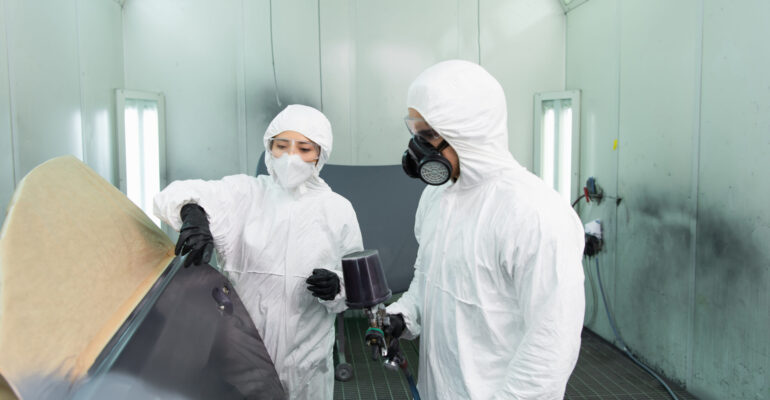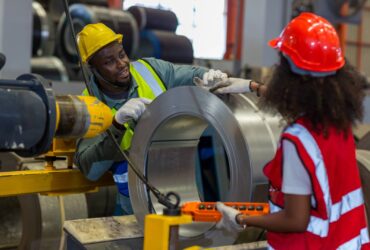24/7 ONLINE SUPPORT

Powder Coating: An Overview
Powder coating is a high-performance finishing process widely used in various industries, known for its durability, versatility, and environmental benefits. At Kaveri Steel Fabs, we specialize in providing top-quality powder coating services designed to enhance the longevity and appearance of metal products. Here’s an in-depth look at the powder coating process, its advantages, and applications.
What is Powder Coating?
Powder coating is a dry finishing process that involves the application of a finely ground powder made from resin, pigments, and additives. Unlike traditional liquid coatings, which use solvents, powder coating is applied electrostatically and then cured under heat to form a tough, protective finish. This process creates a durable, attractive surface that can withstand various environmental conditions.
The Powder Coating Process
Surface Preparation
- The success of powder coating begins with proper surface preparation. This step involves cleaning the metal surface to remove dirt, oil, rust, and other contaminants. Techniques used may include chemical cleaning, sandblasting, or abrasive cleaning.
- Surface preparation is essential for achieving optimal adhesion and ensuring a long-lasting finish.
Application of Powder
- Once the surface is prepared, the powder is applied using an electrostatic spray gun. The gun charges the powder particles, which are then attracted to the grounded metal surface, creating an even coating.
- The thickness of the powder layer can be adjusted based on the desired finish and the specific application requirements.
Curing
- After application, the coated item is placed in a curing oven, where it is heated to a specified temperature (typically between 350°F to 450°F or 175°C to 230°C). This heat causes the powder to melt and flow, forming a smooth, hard coating as it cools.
- Curing is crucial for the development of the coating’s physical properties, such as hardness, adhesion, and chemical resistance.
Quality Control
- Once cured, the coated products undergo a thorough quality control inspection to ensure they meet the required specifications. This may include visual inspections, adhesion tests, and thickness measurements.
Advantages of Powder Coating
Durability: Powder-coated surfaces are more resistant to scratches, chipping, fading, and corrosion compared to traditional liquid coatings. This durability makes powder coating an ideal choice for outdoor and industrial applications.
Environmental Benefits: Powder coating is an eco-friendly option, as it contains no volatile organic compounds (VOCs) and produces minimal waste. Any excess powder can be collected and reused, reducing environmental impact.
Versatility: Powder coatings are available in a wide range of colors, finishes (glossy, matte, textured), and special effects. This versatility allows for customization to meet specific design requirements.
Efficient Application: The electrostatic application process ensures an even coating, minimizing overspray and ensuring efficient use of materials. The curing process is also relatively quick, allowing for faster production times.
Adhesion and Bonding: The curing process creates a strong bond between the coating and the substrate, enhancing the overall performance and lifespan of the product.
Applications of Powder Coating
Powder coating is used across various industries and applications, including:
Automotive: Used for coating wheels, bumpers, and other exterior components to provide protection and enhance appearance.
Construction: Ideal for architectural elements such as railings, windows, and doors, where durability and aesthetic appeal are essential.
Consumer Goods: Commonly applied to appliances, furniture, and sporting equipment, providing both protection and decorative finishes.
Industrial Equipment: Suitable for machinery, tools, and components that require robust protection against harsh environments.
Electronics: Used for coating metal housings and components in electronic devices, offering both protection and aesthetic appeal.
Conclusion
At Kaveri Steel Fabs, our commitment to quality and innovation in powder coating ensures that our clients receive products that not only meet but exceed their expectations. By combining advanced technology with skilled craftsmanship, we deliver powder coating solutions that enhance the performance and longevity of metal products.
Quality Industrial Working
Quality in industrial working is crucial for ensuring consistent, reliable, and efficient operations. It involves maintaining high standards in production processes, from raw material selection to final output. Key elements include:
- Consistency and Reliability: Delivering products that meet specifications consistently builds trust with customers.
- Process Optimization: Regularly evaluating and refining processes enhances efficiency and product quality.
- Skilled Workforce: Training employees ensures they are equipped to uphold quality standards.
- Quality Control Measures: Implementing inspections and testing helps catch issues early, reducing waste and rework.
- Continuous Improvement: Encouraging feedback and adopting improvement methodologies fosters innovation and excellence.
- Compliance: Adhering to industry regulations ensures safety and protects the organization’s reputation.


Frequently Asked Question
The FAQ (Frequently Asked Questions) section addresses common inquiries from clients, providing quick and clear answers about our services, processes, pricing, and quality assurance. It serves as a helpful resource to enhance customer understanding and streamline communication. By offering concise information, the FAQ section helps clients make informed decisions and improves their overall experience with our company.




